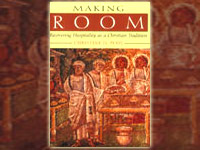Making Room: Recovering Hospitality as a Christian Tradition (Christine D. Pohl, 1999)

It is interesting—and perhaps instructive—that one of the most troubling texts of Scripture rarely seems to trouble most Christians. The text I have in mind is the passage near the end of Matthew’s Gospel in which Jesus describes the judgment of the nations. “All the nations will be gathered” before him, he says, at which time he “will separate the people from one another as a shepherd separates the sheep from the goats” (25:32). The sheep are welcomed into his kingdom, while the goats are banished into “eternal fire prepared for the devil and his angels” (34, 41). This is hardly a popular doctrine in these postmodern times, of course, but Christians do in fact believe in a judgment, and confess as much each time they say the Apostles’ Creed. And I suspect that most of us who claim to be Christians aren’t much troubled by the prospect of this judgment because we assume that since we’re Christians, we have nothing to worry about. But notice what Jesus says next:
“Then the King will say to [the sheep], ‘Come, you who are blessed by my Father; take your inheritance, the kingdom prepared for you since the creation of the world. For I was hungry and you gave me something to eat, I was thirsty and you gave me something to drink, I was a stranger and you invited me in, I needed clothes and you clothed me, I was sick and you looked after me, I was in prison and you came to visit me’” (34-36).
At which they respond, when did we do that? And Jesus says “I tell you the truth, whatever you did for one of the least of these brothers of mine, you did for me” (40). And then he turns to the goats and calls them “cursed” because they did not show such hospitality. “Then they will go away to eternal punishment,” Jesus says, “but the righteous to eternal life” (46).
Which is one reason why Christine Pohl, professor of Christian social ethics at Asbury Theological Seminary, argues that “Hospitality is a way of life fundamental to Christian identity.” In Making Room Dr. Pohl explains the biblical mandate for hospitality, distinguishes it from “entertaining friends,” traces how the practice has been understood throughout church history, and helps us reflect on how hospitality can be restored to its rightful place in our lives, individually and corporately as the people of God. And if there ever was a time when opening our homes and lives to strangers was absolutely essential, it is now, in our deeply broken and fragmented age. “By God’s grace we can grow more willing,” Dr. Pohl writes, “more eager, to open the door to a needy neighbor, a weary sister or brother, a stranger in distress. Perhaps as we open that door more regularly, we will grow increasingly sensitive to the quiet knock of angels. In the midst of a life-giving practice, we too might catch glimpses of Jesus who asks for our welcome and welcomes us home.”
Hospitality is risky in a fallen world, however, and to Pohl’s credit she faces this issue squarely. She points out, for example, that prior to the modern era hospitality was offered to strangers in the public square, in settings where extended family and neighbors knew when someone was opening their home to a stranger. She argues this is not merely a cultural quirk, but a practical safeguard against the risks inherent in hospitality, and suggests ways in which similar safeguards can be erected today. Pohl has not only thought deeply on the topic, she has lived it, and spent time at ministries like L’Abri and L’Arche to learn from those who center their lives and work around community and opening their lives and homes to others. Making Room is the result of her Bible study, numerous interviews, ongoing practical experience, and careful reading of 2000 years of Church teaching.
We recommend Making Room to you as well as the study guide. And if you are like me, so busy that the mere thought of hospitality is wearisome, may I suggest that we might be wise to meditate on what Jesus taught in Matthew 25:31-46.

